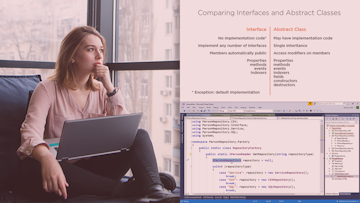
Code that is easy to maintain, extend, and test is key to applications that move quickly to meet our users’ changing needs. In this course, C# Interfaces, you will learn how to use interfaces effectively to create flexible and maintainable applications. First, you will see the mechanics of exactly what interfaces are, and why we want to use them. Next, you will explore how to create your own interfaces to make it easy to change them or swap out functionality. Finally, you will delve into designing effective interfaces to make sure that you are getting the benefits that you need in your specific applications. When you are finished...
Read more
Good to know
Save this course
Activities
Career center
Systems Analyst
Database Administrator
Web Developer
Mobile Application Developer
Game Developer
Technical Architect
Software Architect
Enterprise Architect
Solution Architect
Cloud Architect
Data Architect
Security Architect
DevOps Engineer
Software Engineer
Test Engineer
Reading list
Share
Similar courses
OpenCourser helps millions of learners each year. People visit us to learn workspace skills, ace their exams, and nurture their curiosity.
Our extensive catalog contains over 50,000 courses and twice as many books. Browse by search, by topic, or even by career interests. We'll match you to the right resources quickly.
Find this site helpful? Tell a friend about us.
We're supported by our community of learners. When you purchase or subscribe to courses and programs or purchase books, we may earn a commission from our partners.
Your purchases help us maintain our catalog and keep our servers humming without ads.
Thank you for supporting OpenCourser.


